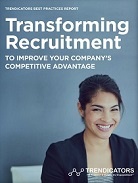
The recruitment landscape is undergoing a seismic shift, and artificial intelligence is at its heart. In our recent webinar, AI in Recruitment: What’s Next, experts explored how AI is evolving from a futuristic concept into a practical, transformative force across hiring functions. The conversation brought together deep insights into the present capabilities of AI, its future trajectory and how HR professionals can prepare for the changes ahead.
AI’s recruitment journey is no longer limited to basic automation tasks. It has evolved from scripted tools to machine learning and deep learning models that adapt, learn and optimize decision-making. During the session, it was said that early AI was about imitation—machines mimicking human behavior. Today, we are seeing Agentic AI systems that can act on behalf of users, drawing insights from complex data sets to recommend, filter and even anticipate needs.
One of the most promising areas of AI in recruitment is in assessments, particularly using unstructured data like open-ended interview responses, resumes or writing samples. Instead of relying solely on multiple-choice tests, organizations can now use AI to analyze how a candidate describes themselves or solves a problem in writing. However, this innovation brings up a pressing concern: bias.
Training AI on historical data can risk perpetuating biases, especially if past decisions were skewed. The good news? AI can also be part of the solution. As shared in the conversation, organizations are beginning to use AI to evaluate AI itself—for instance, analyzing performance reviews for gendered language or unfair evaluations. Yet, caution remains key. Legal teams often raise valid concerns about privacy, fairness and compliance, which require clear guardrails and thoughtful experimentation.
But does this mean recruiters are being replaced? Far from it. AI is a tool—an enabler—not a replacement. Human skills like persuasion, empathy and judgment remain central. AI will take over repetitive tasks, allowing recruiters to step into more strategic roles as talent advisors, labor market analysts and candidate experience champions.
Recruiting isn’t just about matching skills to a job—it’s about inspiring someone to leave a familiar role for a new opportunity. That emotional intelligence, combined with a keen understanding of organizational culture, is not something AI can replicate any time soon.
Still, the adoption of AI is not without challenges. One participant mentioned concerns over candidates using AI tools during interviews—reading answers fed by another AI system in real-time. There’s also the authenticity issue when AI helps craft resumes tailored perfectly to job descriptions. These developments raise new questions about how we measure candidate fit and maintain integrity in the hiring process.
The solution? Training and discernment. Recruiters must stay vigilant and learn how to spot overly polished, AI-generated responses. Techniques like probing questions and unscripted follow-ups can help uncover genuine experience versus well-packaged output.
Looking ahead, recruitment teams will need to build both technical and human skills. On the technical side, basic familiarity with how generative AI works, prompt engineering and an understanding of how tools integrate with compliance frameworks will be essential. Just as important are the human-centric capabilities—communication, relationship-building and strategic thinking.
AI may actually make recruitment more human. By removing the administrative burden from recruiters, we give them more time to engage deeply with candidates. The current job market is often impersonal: ghosting, vague communication and endless waiting are too common. With AI handling the heavy lifting, recruiters can refocus on empathy, connection and support.
As we continue this journey, one thing is clear: AI in recruitment isn’t about replacing people but empowering them. With the proper guardrails, training, and mindset, HR professionals can lead their organizations to a smarter, more human future in hiring.
To watch AI in Recruitment: What’s Next, click the watch session button below.



